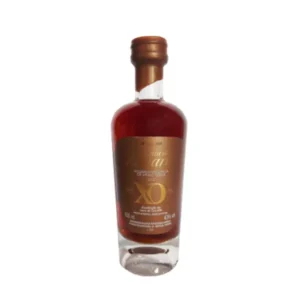Jack Daniel's Old nº 7 20cl
14,90 €
![]() Origin United States
Origin United States
Smoothed drop by drop through 10 feet of sugar maple charcoal, then matured in handcrafted barrels of our own making. And our Tennessee Whiskey doesn't follow a calendar. It's only ready when our tasters say so. We judge by appearance. For its aroma. And, of course, by the way it tastes. This is how Jack Daniel himself did it more than a century ago. And how we still do it today.
5 in stock
Description

There is an interesting image that hangs in Mr. Jack Daniel's old office. It's a photo of Mr. Jack taken with his distillery team. What makes the portrait so intriguing is the gentleman sitting immediately to Jack's right, an African-American laborer. Given the time period in which this photo was taken – around 1900 – and the racial divide that permeated the American South, it is intriguing to see an African American sitting next to a business owner. But their closeness in this photo underscores the remarkable relationship that is at the heart of how Jack came to make whiskey.
The man in the photograph above, we have reason to believe, is George Green. In addition to being friends with Jack, George was also the son of Nathan “Nearest” Green. And it's Nearest Green, along with Reverend Dan Call, who taught Jack Daniel about making whiskey on an estate still owned by the Lutheran minister.
Leaving home early, Jack ended up living and working on Reverend Call's farm in the late 1850s, before Jack reached his teens. They say Jack had a difficult relationship with his stepmother and that's why he left home. The Call farm was located about five miles from Lynchburg, near Lois, Tennessee. On his farm, Call was quiet and Jack quickly took an interest in him. Now this was in the days before the Civil War and Emancipation and the Calling was still under the watch and care of an enslaved man named Nathan “Nearest” Green. Reverend Call and his distiller, Nearest, taught Jack how to make whiskey. Most of that guidance, however, was attributed to Nearest, who worked side by side with Jack and taught the young distiller what his life's passion would be.
After the Civil War, the congregation and Reverend Call's wife gave the preacher an ultimatum: refrain from making whiskey or step away from his work as a minister. Call made the decision to sell his business to Jack. And so Nearest, now a free man, was hired by Jack and became the first head distiller – or what today we would call master distiller – at the Jack Daniel Distillery. Although slave labor was a part of life in the South before the end of the Civil War, Jack Daniel not only never owned slaves, but also worked side by side with them as a contractor for Dan Call. When the time came after the war to establish his own distillery, Jack's team were all contractors.
Nearest would work with Jack as his first master distiller until Jack moved his operation to Cave Spring Hollow sometime after 1881. There, Nearest's sons George and Eli and his grandchildren Ott, Jesse and Charlie continued the Green family tradition, working at Jack's Distillery in the Cave Spring Hollow.
More than 150 years have passed since Nearest and Jack began making whiskey together, and to this day there has always been a member of the Green family working at the Jack Daniel distillery. If you find time to visit us in Lynchburg, you can see the portrait of Jack and Nearest's son , George Green , which is located in Jack's old office and hear a little more of this unique story of two men, their friendship and the whiskey they made together.
Additional information
| Weight | 0,6 kg |
|---|





